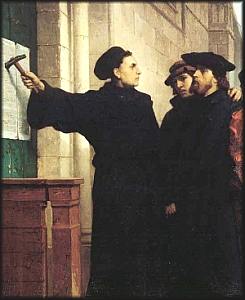I enjoy reading Coffee with Jesus, one of those minimalist Comics 2.0 strips where the images don’t really matter but the text does.
While I normally nod my head in agreement, a recent strip bothered me:

Is it naive to think that all you and I really need is Jesus? That He is the only one we should listen to?
I mean, Paul said to imitate him as he imitated Jesus. And we are a Church, which is meant to function as a Body, which means communication between the parts. And my spiritual gifts are not intended just for me alone.
The other day, I was considering whether two of history’s most respected events/institutions have actually amplified our confusion within the Western Church. Anyone who has a pair of eyes and ears can look and see that the Church is struggling in what seems to be a losing battle against a degenerating culture, while simultaneously drifting along with what that degenerating culture deems important, breaking down into 40,000 sects, schisms, and strains as a result.
The Protestant Reformation attacked the singular authority of the united Roman Catholic Church and deemed that each man and woman has been empowered to be his or her own priest. Reading the Bible for oneself and coming to a personal understanding of what it says was a hallmark of the Reformation. This idea broke the (genuine) stranglehold the RCC had on most of Christianity. It wrested power away from the controlling, organized clergy and put it back into the hands of the people.
Most would consider the Reformation an improvement.
In the New World years later, democracy took hold in the federal republic of the nascent United States of America. The idea that power rests in the will of the people mimics politically those spiritual concepts found in the Protestant Reformation. The two go hand in hand, and it’s hard to imagine America as a democracy without Martin Luther and his “rabble-rousing” kin.
Most would consider democracy an improvement.
But were the Protestant Reformation and democracy an improvement for the Church?
Reading that Coffee with Jesus above, one wonders. In turning every man and woman into his/her own spiritual authority, have we introduced too much confusion into the Christian faith?
If I am my own authority while I listen to the Redeemer, what happens when I encounter someone who thinks he is the authority while he listens to the Redeemer? What happens is that he drifts into a sect of his own leaning while I drift into another.
The comic above nails the problem. But does it only muddy the solution?
One of the most damning verses in the Bible:
In those days there was no king in Israel. Everyone did what was right in his own eyes.
—Judges 17:6 ESV
While spiritual people will clearly note that this “right” was too often downright wicked, what happens when we in the Church get into a situation where the Good is the enemy of the Best?
Paul says that when a revelation is given, the spiritual will debate its veracity and usefulness so as to arrive at a united understanding. Does this happen, though? Or are we too quick to start another sect because we can’t reach unity because we have made everyone his own authority?
A joke many have heard, but it applies here:
Once I saw this guy on a bridge about to jump. I said, “Don’t do it!” He said, “Nobody loves me.” I said, “God loves you. Do you believe in God?”
He said, “Yes.” I said, “Are you a Christian or a Jew?” He said, “A Christian.” I said, “Me, too! Protestant or Catholic?” He said, “Protestant.” I said, “Me, too! Which denomination?” He said, “Baptist.” I said, “Me, too! Northern Baptist or Southern Baptist?” He said, “Northern Baptist.” I said, “Me, too! Northern Conservative Baptist or Northern Liberal Baptist?”
He said, “Northern Conservative Baptist.” I said, “Me, too! Northern Conservative Baptist Great Lakes Region, or Northern Conservative Baptist Eastern Region?” He said, “Northern Conservative Baptist Great Lakes Region.” I said, “Me, too!”
Northern Conservative†Baptist Great Lakes Region Council of 1879, or Northern Conservative Baptist Great Lakes Region Council of 1912?” He said, “Northern Conservative Baptist Great Lakes Region Council of 1912.” I said, “Die, heretic!” And I pushed him over.
The Coffee with Jesus strip above certainly had this joke in mind. Yet as much as the comic says the answer is to listen to Jesus alone, it seems doing so still resulted in 40,000 sects, schisms, and strains.
Makes you wonder sometimes about the Reformation and a democratic mentality.

 and vicious church factions debating the same “who is greater?” nonsense that got the disciples in hot water with Jesus. Truthfully, our practice of the priesthood of all believers better resembles that classic line from George Orwell’s Animal Farm.
and vicious church factions debating the same “who is greater?” nonsense that got the disciples in hot water with Jesus. Truthfully, our practice of the priesthood of all believers better resembles that classic line from George Orwell’s Animal Farm. From the Shepherd’s Conference (so ably liveblogged by
From the Shepherd’s Conference (so ably liveblogged by